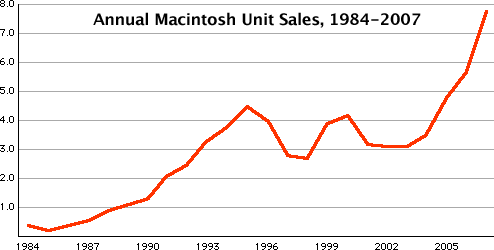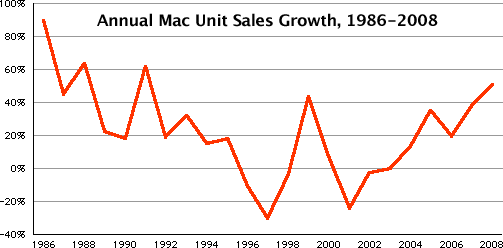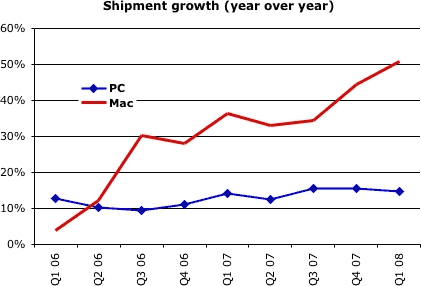The good folks over at Groklaw have the full details of Psystar's
countersuit against Apple. Psystar mostly claims that it doesn't
know anything, denies the rest, and then goes on to tell how Apple is
an evil monopoly that has to be stopped by requiring them to license
the Mac OS (which Psystar seems to know so little about!).
It's surprising how much they know about the evils of Apple, yet it
claims Psystar is not aware that it did anything wrong. This is typical
legal double talk. It impresses people, as seen in Psystar Files Answer to Apple
Complaint - 'M' Word Used Enthusiastically - the comments show how
people will believe whatever they want.
Cheapskates
I find it strange how easy it is for people who never use Apple
computers to read these counterclaims and claim they would buy a cheap
Mac clone if only Apple would let them. Somehow it is magically fair
that Apple opens its software for an outside hardware company without
regard to the cost or effect on Apple and its brand name. Who cares
about the costs that Apple had to expend to build their business and
the years of battling for relevance in a world satisfied with Windows
PCs?
None of that matters to these anti-elitists, who want to turn the
Mac OS into a replacement for the crummy Windows world they've been
living in.
Well, if they weren't a bunch of cheapskates, they could have a Mac
today - or they could donate some of their hot air to the Linux cause
and try that option.
Don't get me wrong: If Apple was a monopoly and employed
anticompetitive behavior, that could be a problem. But stopping some
low-budget company from free riding on your trademarks and hard work is
not anticompetitive.
You Can Switch
I'll go so far as to say that if you really want, you can switch
from Mac to Windows or Linux. Granted, I won't claim that Windows is a
great substitute for Mac OS X, but you can switch. for
example, Kate MacKenzie, recently of Mac
360, tried to make a big deal out of
her change of heart for everyone to see. (BTW, thanks Kate. I hope
Apple's lawyers get to use you as a public example in their arguments.)
Apple obviously isn't holding a gun to anyone's head to keep them in
the fold.
If you can switch from a PC to a Mac - or, if your brain becomes
addled, you can switch from a Mac to PC - then Macs aren't a very good
monopoly.
If Psystar wanted, they could release their own version of BSD Unix
to compete directly with Apple, because Mac OS X is built on that
open source operating system. It's the polished details of the Mac OS
that make it better, not fundamental functionality.
Unique ≠ Monopoly
If selling your own patented, copyright protected product makes you
a monopoly, then a lot more is on the line than just Mac clones. Every
company uses unique products to differentiate itself from the
competition - everything from Coke to BMW. Claiming that they are all
separate monopolies and anticompetitive (by Psystar's definition) would
mean that any company could come along and demand licensing on its own
terms to sell a cheaper version of the same product any way they
want.
fortunately we have laws protecting Apple's ownership of these
things. Psystar cannot come in and trample on Apple's rights without
being sued.
Yes, sued. That's how the law decides these issues. Apple can't have
the police come in and arrest Psystar's owners. Apple has to settle the
issue in court with lawyers on both sides arguing the merits. While we
hate lawsuits, sometimes it's the only way to get justice.
Mac OS X ≠ Microsoft Windows
From my last article about Psystar, Apple Gave Psystar Enough Rope to
Hang Itself, and reader responses to it,
I know that many people are sympathetic to Psystar. They see that
Microsoft is making big money licensing Windows, and they don't see any
reason for Apple not to do the same. But just because it works for
Microsoft doesn't mean that it will for Apple.
It took years for Microsoft to get where it is today. It employed
every form of coercion and anticompetitive practice it knew to gain a
monopoly (over 95% of the PC market at one point). Many people cheered
it on, thinking a monopoly was the only way to bring order to the
fractured market.

Microsoft won, but opening up the Mac OS won't reverse things
overnight. Apple didn't fare well the
last time they tried to license their OS. There was no gain in
market share for the Mac OS, let alone for Apple. The choice to license
the Mac OS almost ruined Apple's own hardware sales; Apple had negative
sales growth in 1996 and 1997, the peak years for the clones. This was
bad news, because Apple is a hardware company.

Psystar doesn't care about Apple or Macs. They see Macs as an easy
way to promote sales. (Easy because Psystar didn't develop the software
patch to make OS X work on non-Apple computers. They stole most,
if not all, of the software fixes from other developers.)
Who wouldn't want everything that is great about the Mac for a lower
price? Why shouldn't Psystar cash in on this demand?
But Psystar is not contributing to Apple's brand equity; it is only
using it to steal customers from Apple and benefit from the Mac's
growing market share.

Psystar Stands Alone
I doubt that you'll see any statements - not even from a company
like Dell - in support of Psystar. Sure Michael Dell has said that he
would sell computers with the Mac OS X if Apple would let
him, but he isn't going to support some upstart coming in to free
ride on another company's good name. Who knows what kind of upstart
company might try to pull that trick on Dell at some point in the
future? And if the countersuit works for Psystar, who's to say that the
same logic wouldn't come back to haunt them in the future?
What Psystar is asking for is a free ride on another company's hard
work. Their lawyers can make it sound as fancy as they want, but that's
what it boils down to. Psystar admits in its counterclaim how hard it
is to enter the OS market (general allegations 20 and 46). Psystar
wants to save all that work and go right to taking over someone else's
work.
Groklaw reports that Psystar has also appropriated the work of the
OSx86 Project and others
without adhering to their licenses.
Why can't the average person see the pattern of abuse that Psystar
is using? Is the demand for low-cost Macs so high that people will
latch onto a loser like Psystar?
Deep Pockets?
I don't think Psystar will win, but a lot of money is going to be
spent on lawyers before this battle is over. I hope whoever is paying
for Psystar's lawyers has deep pockets.
If Psystar does plan on spending tons of money on lawyer fees, it
makes you wonder what they hope to gain? Is the right to license the
Mac OS so valuable that hiring expensive lawyers and investing years of
litigation is worth it? A better plan would be to use this sham as a
way to tarnish Apple's reputation, slow its sales, and distract Apple
from developing new products.
I think Apple can handle the distraction, but can the media or the
public? Most of them seem to be brain-dead regarding big issues, so
they may fall for this ruse as well. Often the company yelling the
loudest gets all the attention, and usually that won't be Apple, which
keeps product announcements and pending litigation under strict
control.
The Psystar camp has nothing to lose by turning this into a media
circus and hopes to get the public on their side.
In the end, we have to leave it for the courts to decide. That is
the American way, and we hope justice will be blind to the news reports
and decide based on the facts of the case, not opinion.






